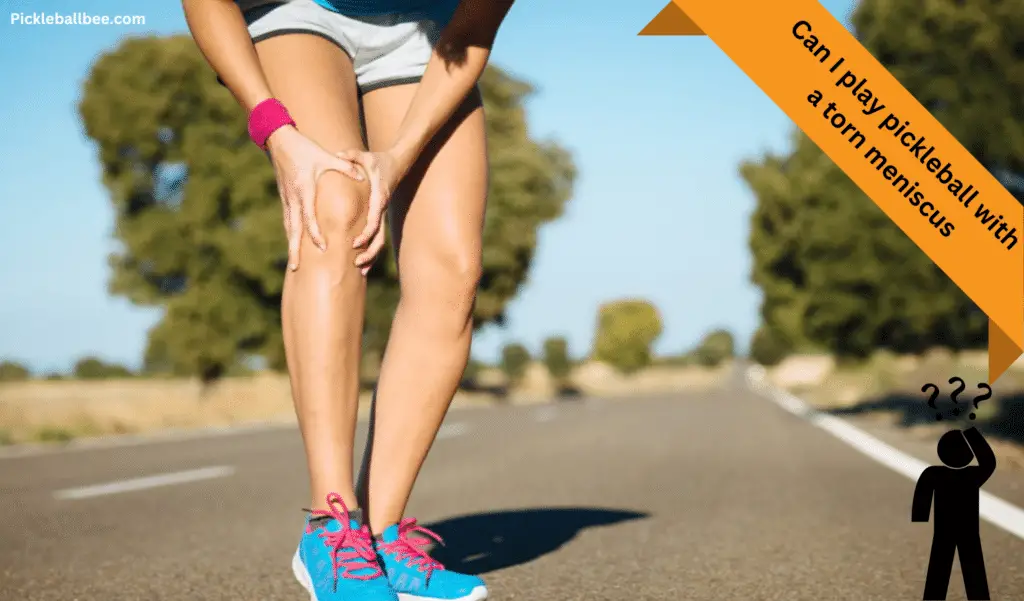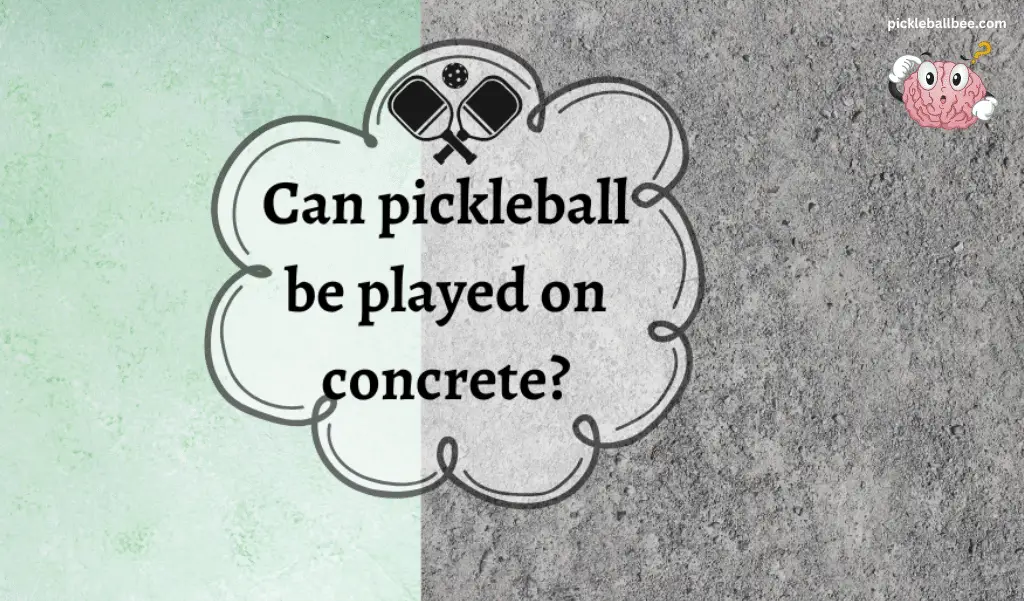Pickleball is a fun game with a smaller court and a different ball, like tennis. Many folks love playing it, especially when the sun is shining. But what about when it rains? Can Pickleball be Played in the Rain? Wet conditions, especially rain, make everything slippery. The court can become treacherous, posing significant weather challenges for outdoor sports like pickleball. Nobody wants to fall and get hurt. The ball might also act differently on a wet court. It might bounce lower or slide a bit.
Some people might worry about equipment maintenance, as their paddles could get ruined in the rain. Playing in the rain might be fun for some, but thinking about game safety is essential. So, before you decide to play pickleball in the rain, it’s good to know the pros and cons. In this article, we’ll explore whether it’s a good idea.
Table of Contents
Can pickleball be played in the rain?

The short answer is yes, but it’s not always a good idea.
The main concern is safety. When it rains, the court becomes slippery, increasing the risk of players slipping and getting injured(Torn Meniscus). Then there’s the issue with the ball; when it’s wet, it doesn’t bounce or move as expected, making the game more unpredictable.
The paddle’s grip can also be a challenge. Holding onto a wet paddle is tricky, and there’s a chance it might slip right out of your hand during a crucial shot. And let’s remember the equipment.
If your paddle or ball is constantly exposed to rain, it might only last a while. While playing in the rain might sound fun and refreshing to some, it comes with challenges. For a safe and enjoyable game, waiting for the rain to pass and the court to dry is often better.
Issues With Playing Pickleball In The Rain

Slippery Courts:
One of the most immediate concerns with playing pickleball in the rain is the condition of the court. Rainwater makes the surface slick and slippery. This poses a significant risk for a game that requires swift footwork and sudden direction changes. Players might quickly lose their balance, leading to falls and potential injuries. It’s not just minor scrapes; severe injuries like sprains or fractures can occur. Thus, a wet court can turn an enjoyable game into a hazardous activity.
Unpredictable Ball Behavior:
Rain introduces an element of unpredictability to pickleball. When the ball is wet, its dynamics change. It becomes heavier, affecting its bounce and flight. Players might notice that their usual shots don’t land where they expect, or the ball might skid on the surface instead of bouncing. This unpredictability can be frustrating and requires players to adjust their strategies. The essence of the game changes, making it more about adapting to the conditions than skill and technique.
Compromised Paddle Grip:
The paddle is a player’s primary tool in pickleball. When it rains, the handle can become wet, compromising the player’s grip. A weak grip can lead to inaccurate shots or the paddle slipping out of the hand entirely. This disrupts the game and can pose a risk if the paddle flies off unexpectedly. Players might focus more on holding their paddle than on the game itself.
Equipment Wear and Tear:
Prolonged exposure to water is not ideal for most sports equipment, and pickleball is no exception. Whether it’s wooden paddles or those made from composite materials, moisture can cause warping, peeling, or other forms of degradation. The ball, too, can wear out faster when played wet. Over time, players might have to replace their equipment more frequently, leading to additional costs.
Reduced Game Enjoyment:
Beyond the technical and safety concerns, there’s the simple matter of enjoyment. Pickleball is played for fun, and challenging weather conditions can detract from that. Rain can be a constant distraction, with players possibly feeling cold and wet. Vision can be obscured, and the sound of raindrops might drown out the game’s natural sounds. For many, playing pickleball in the rain isn’t as enjoyable as playing in good weather.
Is it safe to play pickleball on wet courts?

When the question arises about the safety of playing pickleball on wet courts, the primary concern is always the players’ well-being. Wet courts significantly change the dynamics of the game and introduce potential hazards. As moisture accumulates on the court’s surface, it becomes slippery. This poses a risk for players rushing, pivoting, and frequently changing directions. Slips and falls are more likely to lead to injuries, from minor scrapes and bruises to more severe concerns like sprains or fractures.
Additionally, the game’s predictability is affected. Players rely on consistent court conditions to judge ball bounces and plan their shots. On a wet court, the ball might skid or not bounce as expected, catching players off guard. This can lead to wrong footing, sudden stops, and rapid direction changes, which increase the risk of injury on an already slippery surface.
Moreover, playing on wet courts can also result in longer-term physical strain. Players might exert more effort to maintain balance or counteract the ball’s unpredictability. This could lead to muscle strains or fatigue, mainly if they’re not used to such conditions.
Alternative to Playing Pickleball in the Rain
When rain interrupts outdoor pickleball, consider shifting to indoor courts at many sports centers. These offer a weather-proof environment, ensuring consistent play without the challenges of wet conditions. If an indoor court isn’t accessible, use the time to focus on strategy. Watch pickleball tutorials, discuss game tactics with peers, or delve into virtual games. Alternatively, engage in exercises or drills at home that enhance your skills. Rain might pause outdoor matches, but it can’t dampen the spirit of the game; there’s always a way to stay connected and improve.
How does the rain affect the overall pickleball game?
In the world of sports, pickleball stands out for its reliance on even ground and precision. However, when rain enters the equation, it significantly affects the game. The once-easy task of maintaining balance and executing high-quality plays becomes a challenge. Rain introduces unpredictability, making it harder to determine the ball’s trajectory or control the racket with the usual finesse. Players often find themselves failing to strike the ball effectively, battling against slippery surfaces and sighting issues. This situation demands a higher overall ability and adaptability from players, who must expect a completely altered gameplay style, where conventional strategies might no longer hold true.
Rain can drastically alter the game’s dynamics. The rain introduces resistance to swings, slowing down the speed at which players can hit the ball, and making it difficult to swing effectively. This change in movement and contact with the ball affects its traveling path, often unpredictably. Additionally, rain could angle into a player’s eye, causing visibility challenges and potentially making the game unfair for one player over another. Players must also adapt quickly, as rain may alter both their tactics and physical responses in real time.
When rain falls during a pickleball match, it introduces numerous disadvantages and problems. Playing in such conditions can significantly increase the risk of injury. As much as people insist on playing for fun, safety should take precedence. If rain ends up interrupting play, it’s wise to reschedule the match to a date when the weather is more favorable. Even though pickleball is enjoyed by many, adapting to the rain’s impact is challenging, as it alters the sport’s dynamics. Players face a slippery court, making it hard to maintain balance and control.
In such scenarios, you have to think about the well-being of everyone involved, specific to the day and time. The best thing to do in these situations is to find a better, safer time to play, ensuring all players can compete without the added conditions of the rain.
If you find yourself in the middle of the game and it starts raining, the best thing to do is to take note of the scores and continue to play later on when the rain stops. However, if stopping is not an option for both teams or players, then finding an indoor space to continue with the game becomes another option. This approach allows the game to progress without compromising safety and maintaining the integrity of the match. In such scenarios, flexibility and quick decision-making are crucial for both the players and the organizers.
Can you get a pickleball paddle wet?
Step 1: Understand the paddle’s material.
Modern pickleball paddles are made of materials like graphite or fiberglass, which can handle some moisture. However, this doesn’t mean they’re waterproof.
Step 2: Avoid prolonged exposure.
While a brief encounter with rain might not harm your paddle immediately, prolonged exposure can affect its lifespan and performance. It’s best to avoid playing in the shower or in wet conditions.
Step 3: Check the grip.
The paddle’s grip is particularly susceptible to moisture. A wet grip can become slippery, reducing your control over the paddle and potentially leading to missed shots or accidental throws.
Step 4: Dry your paddle.
If your paddle gets wet, don’t leave it damp. Wipe it down with a dry cloth and let it air dry to ensure no moisture remains trapped in its layers.
Step 5: Store appropriately.
Always store your paddle in a dry place away from direct sunlight. This helps maintain its condition and ensures it’s ready for your next game.
Can You Play Pickleball In The Wind?
Pickleball can be played in the wind, but it introduces a unique set of challenges. The lightweight nature of the pickleball means even a slight breeze can drastically alter its trajectory, making shots unpredictable. Players need to adjust their strategies, from repositioning themselves to changing the force of their attempts to counteract the wind’s influence.
Moreover, the wind can affect the paddle’s handling, as gusts can catch its broad face, making it harder to control. While some players relish the added challenge, seeing it as a way to refine their skills, others might find it frustrating. In essence, while wind adds a layer of complexity to pickleball, with adaptability and a keen sense of judgment, it’s entirely possible to enjoy a game, even on a breezy day.
Conclusion:
Pickleball, though enjoyable, poses risks in adverse weather like rain. Wet courts and unpredictable equipment behavior necessitate prioritizing player safety over the thrill of playing in the shower. Instead of braving wet conditions, enthusiasts can turn to indoor courts or focus on honing skills and strategies. Ultimately, pickleball’s true essence lies in playing, the community, and the continuous learning associated with the sport.
FAQs:
1. Does cold weather affect pickleball?
Yes, cold weather can affect pickleball. Low temperatures may impact ball bounce, player movement, and overall gameplay. Warmer weather is generally more conducive to optimal pickleball conditions.
2. Can you play pickleball on a tennis court?
Yes, you can play pickleball on a tennis court. Pickleball can be adapted to fit within a tennis court’s dimensions by using temporary lines or sharing the space for both sports.
3. What are things you Cannot do in pickleball?
In pickleball, you cannot hit the ball out of bounds, step into the non-volley zone (kitchen) and hit a volley, volley the ball before it bounces, let it jump twice before returning, or physically interfere with the opponent’s shot. These rules ensure fair and proper gameplay.


